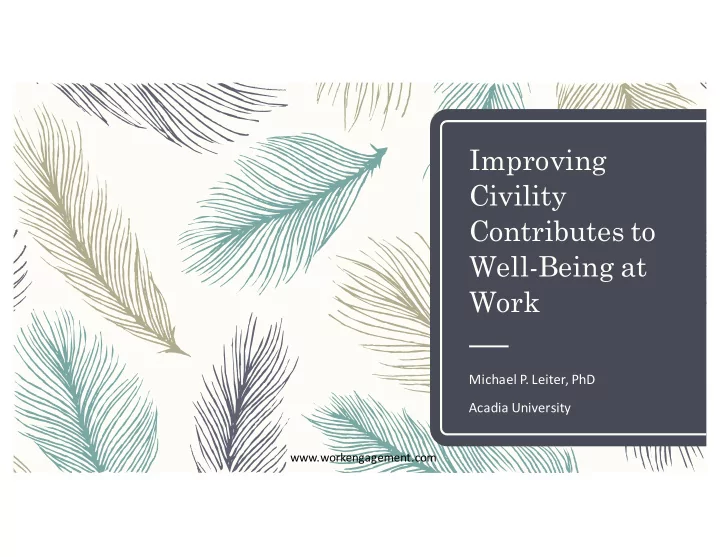

Improving Civility Contributes to Well-Being at Work Michael P. Leiter, PhD Acadia University www.workengagement.com
Connections with Work Engagement Burnout ´ Energetic ´ Sustainable Pace of Work & Life Exhausted Energetic ´ Re-energizing Cycles ´ Dedicated ´ Involved, Committed ´ Emotional Connection with Work Distant Dedicated ´ Encouraged ´ Sense of Efficacy ´ Recognition from Others Discouraged Encouraged www.workengagement.com
Preventing & Alleviating Burnout Realigning • Reduce Illegitimate Demands • Enhance Resources Imbalances • Enhance Resiliency & Recovery Overcoming • Belonging • Autonomy Frustrations • Mastery
Dynamics: Workplace Community Problems – Social Mistreatment Bullying – Abuse – Aggression – – Poor Workplace Culture Incivility – Disrespect – Low Contact – www.workengagement.com
Dynamics: Develop a Social Culture Group Social Encounters Culture Creative Civility v Incivility Collaborative Intensity Competitive Intention Destructive
Dynamics: Frustration of Core Motives – Frustration Belonging : Inclusive Workplace Community – Autonomy : Trust & Confidence to Take Initiative – Mastery : Appreciation and Recognition – Burnout – Exhaustion : Emotional, Practical Costs of Discord – Cynicism : Frustration of Belonging, Autonomy – Inefficacy : Frustration Mastery, Autonomy –
The Downside of Social Encounters – Relationships Consume Energy – Emotional Impact of Unpleasant Encounters Immediate – Delayed Rumination – Disrupting Recovery – – Burdens of Leadership or Collegiality Time Demands – Demands on Emotional Intelligence, Social Skills – Illegitimate Social Demands –
The Upside of Social Encounters – Relationships Conserve and Generate Energy – Fulfilling Core Motives Belonging – Agency – Mastery – – Furthering Effectiveness Shared Mission & Values: Bigger Impact – Practical Assistance – Increased Options, Flexibility –
Thresholds for Behavior Granovetter: Threshold Model of Collective Behavior – Prime Model—Riots—Applied to Workgroup Incivility – People Vary re Incivility Threshold – Low Self Management – History of Discord with Colleagues – Individual Mission – Situations Vary in Incivility Elicitation – History of Civility Culture – Monitoring of Respectful Behavior – Reaction to Violations of Explicit Norms –
Threshold Shift – Individual Instruction in Civility & Respect – Increase Salience of Contingencies – – Workgroup Strengthening Civility Culture – Reduce Threshold for Civility – Increase Threshold for Incivility – www.workengagement.com
Impact of CREW: Civility, Respect, Engagement at Work – Five Hospitals in Ontario and Nova Scotia Wave 1: Eight CREW Groups (N=252) – Wave 2: Seven CREW Groups (N=226) – Control: 26 Units No CREW (N=874) – – Hypothesis: Improvement for CREW – Steady for Control – And it stays that way – Leiter, M. P., Laschinger, H. K. S., Day, A., & Gilin-Oore, D. (2011). The impact of civility interventions on employee social behavior, distress, and attitudes. Journal of Applied Psychology, 96 , 1258-1274 . Leiter, M. P., Day, A., Laschinger, H. K. S., & Gilin-Oore, D. (2012). Getting better and staying better: Assessing civility, incivility, distress, and job attitudes one year after a civility intervention. Journal of Occupational Health Psychology, 17, 425-434.
Impact on Civility www.workengagement.com
Impact on Civility www.workengagement.com
Impact on Burnout & Illness www.workengagement.com
Impact on Burnout & Illness www.workengagement.com
CREW: Active Ingredients – Put Civility on the Agenda – Problem Solving Format Constructive Relationships as Primary Resource – Responsibility to Address Dysfunctional Relationships – – Group Process Interactive Format: Sharing Concerns about Relationships – Role Plays and Structured Exercises – Resetting Thresholds for Civility and Incivility – Leiter, M. P., Laschinger, H. K. S., Day, A., & Gilin-Oore, D. (2011). The impact of civility interventions on employee social behavior, distress, and attitudes. Journal of Applied Psychology, 96 , 1258-1274 . Leiter, M. P., Day, A., Laschinger, H. K. S., & Gilin-Oore, D. (2012). Getting better and staying better: Assessing civility, incivility, distress, and job attitudes one year after a civility intervention. Journal of Occupational Health Psychology, 17, 425-434.
Intervention Format CREW CARAWay – Focus: Broad Group Process – Focus: Civility & Respect – Group Format – Group Format 20-25 Weekly Meetings – 4- 6 Monthly Meetings – 10-15 Member Groups – 10-40 Member Groups – – Research Foundation – Encouraging Pilot Improved Civility – Reduced Burnout –
CARAWay Pilot 2016 Social Constructs Before and After CARAWay 0.10 0.00 -0.10 -0.20 -0.30 -0.40 Incivility Trust -0.50 -0.60 Time 1 Time 2
4 As of Civility Acknowledgement : Saying or doing something that – recognizes another person’s presence. It could be as simple as smiling or wishing a good morning. Appreciation : Expressing thanks for another person’s – contribution or expressing admiration for the quality of that contribution. Acceptance : Explicitly or implicitly welcoming a person into – your conversation, group, or project. Accommodation : Modifying your activities or space in ways – that helps another person participate or to work more comfortably or effectively. http://workengagement.com/caraway
Monitoring – Organizational Surveys – Institutional Records – Workgroup Monitoring – – Personal Keeping A Diary – Charting Countables – www.workengagement.com
Individual Action – First Step: Recruit an Ally Emotional Support – Structuring Both Sides of an Interaction – – Maintaining Focus Measurement – Baseline – Ongoing – Afterwards – Public Commitment –
Sustaining Change Monitor, Analyze, Report – Surveys – Tracking – Sharing – Structures – Regular Agenda Items – Posters, Articles, Conversations – Respond – Emphasize What’s Working – Change What’s Not Working –
Conclusion – Burnout = Imbalance and Frustration – Community Improving Civility Culture – Individual Thresholds – Group Facilitation of Behavior – – Action Individual Tracking – Group Process Development – Systems for Sustaining Gains – www.workengagement.com
Recommend
More recommend